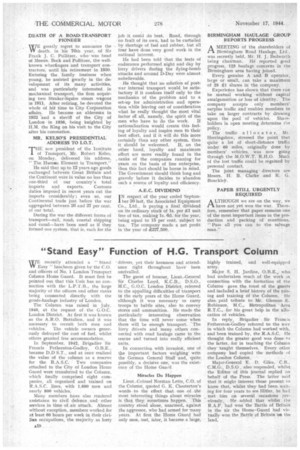"Stand Easy" Function of H.G. Transport Column
Page 20

If you've noticed an error in this article please click here to report it so we can fix it.
WE recently attended a "Stand VI' Easy "luncheon given by the CO. and officers of No. 1 London Transport Column Home Guard. It must first he pointed out that this Unit has no connection with the L.P.T.B., the large majority of the officers and other ranks being connected directly with the goods-haulage industry of London,
The Column was raised in July, 1940, at the request of the G.O.C. London District. At first it was known as the A.R.O. Battalion, and it was necessary to recruit both men and
vehicles. The vehicle owners generously defrayed the cost -of fuel, whilst others granted free accommodation.
In September, 1942, Brigadier Sir Francis Fetherston-Godley, 0.13.E., became D.D S.T., and at once realized the value of the column as a reserve for the R.A.S.C. Two companies attached to the City of London Home Guard were transferred to the Column, which finally comprised eight companies, all organized and trained on R.A.S.C. lines, with 1,600 men and nearly 800 vehicles.
Many members have also rendered assistance to civil defence and other services in time of air attack, Almost without exception, members worked for at least 60 hours per week in their civilian occupations, the majority as lorry *IS
-drivers, yet their keenness and attendance right throughout havebeen unrivalled.
The guest of honour, Lieut.-General Sir Charles Loyd, K.C.B.. D.S.O., M.C„ G.O.C. London District, referred to the appalling difficulties of transport in the early years of the Ilome Guard, although it was necessary to carry troops to battle sites, also to convey stores and ammunition. He made the particularly interesting observation that the time will never come when there will be enough transport. The lorry drivel's and many others connected with road haulage came to the rescue and turned into really efficient units.
In connection with invasion, one of the important • factors weighing with the German General Staff and, quite possibly, a decisive one, was the existence of the Home Guard.
Miracles Do Happen Lieut.-Colonel Norman Letts, C.O. of the Column, quoted G. K. Chesterton's words to the effect that one of the most interesting things about miracles is that they 'sometimes happen. This country stood alone, unarmed, against the aggressor, who had armed for many years. At first the Home Guard had only men, nut, later, it became a large, highly trained, and well-equipped army.
Major S. H. Jardine, 0.B.E., who had undertaken much of the work In connection with the formation of the Column gave the toast of the guests and included a brief history of the raising and training of the Column. He also.paid tribute to Mr. Gleason E. Robinson; MC., Metropolitan Area R.T.C., for his great help in the allocation of vehicles.
In reply, Brigadier Sir Francis Fetherston-Godley referred to the way in which the Column had worked with, and been trained by, the R.A.S.C. He thought the greater good was done to the latter, -for in teaching the Column they taught themselves. Every other company had copied the methods 01 the London Column.
Major-General E., D. Giles, C.I3., C.M.G., D.S.O., also responded, whilst the Editor of this journal replied an behalf of the Press. The latter said that it might interest those present In know that, whilst they had been waiting for four years to see Hitler, he had met him on several occasions previously. He added, that whilst the R.A.F. had Won the Battle of Britain in the air the Home-Guard had virtually•won the Battle of Britain on the land_




















































